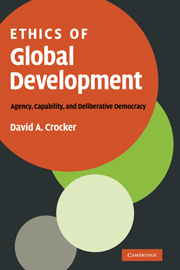Book contents
- Frontmatter
- Contents
- List of figures
- Acknowledgments
- 1 Introduction
- Part I Development ethics
- Part II The capability approach: ethical foundations
- Part III Strengthening and applying the capability approach
- Part IV Deliberative democracy, participation, and globalization
- 9 The capability approach and deliberative democracy
- 10 Deliberative participation in local development
- 11 Development ethics, democracy, and globalization
- Index of names
- Index of subjects
10 - Deliberative participation in local development
Published online by Cambridge University Press: 22 September 2009
- Frontmatter
- Contents
- List of figures
- Acknowledgments
- 1 Introduction
- Part I Development ethics
- Part II The capability approach: ethical foundations
- Part III Strengthening and applying the capability approach
- Part IV Deliberative democracy, participation, and globalization
- 9 The capability approach and deliberative democracy
- 10 Deliberative participation in local development
- 11 Development ethics, democracy, and globalization
- Index of names
- Index of subjects
Summary
In this chapter I aim to improve the theory and practice of participation in local, grassroots, or micro-development initiatives. Accomplishing this goal requires three steps. First, in order to clarify the different approaches to “participation” that have occurred in the last fifty years of development theory and practice, I discuss and enrich some classifications of types of participation, including those of Denis Goulet, J. N. Pretty, John Gaventa, Bina Agarwal, and Jay Drydyk. In relation to these accounts of participation, I propose and explain an ideal of deliberative participation derived from the theory and practice of deliberative democracy presented in the last chapter.
Second, in terms of these kinds of participation, and especially the ideal of deliberative participation, I analyze economist Sabina Alkire's recent efforts, in Valuing Freedoms: Sen's Capability Approach and Poverty Reduction, to apply Sen's theory to micro-projects. Although I find much to approve of in her approach to grassroots participation, I argue that it could be strengthened by features of deliberative participation.
Finally, I analyze and evaluate four objections that have been made to (1) Sen's democratic turn in his version of the capability approach, (2) the theory and practice of deliberative democracy, and (3) deliberative participation in local development. Critics find these allied accounts of robust democracy and citizen participation flawed by too much indeterminacy, too little autonomy, insufficient realism, and unjustified or unacceptable egalitarianism.
- Type
- Chapter
- Information
- Ethics of Global DevelopmentAgency, Capability, and Deliberative Democracy, pp. 338 - 374Publisher: Cambridge University PressPrint publication year: 2008

